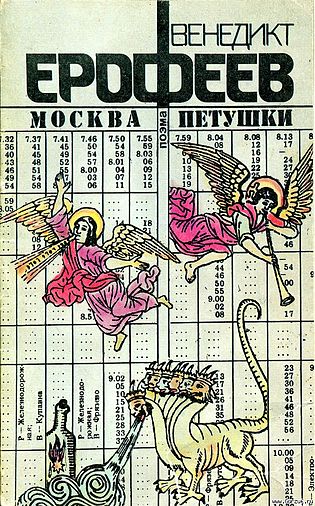
- Moscow to the End of the Line
- Published by: Self-published (Samizdat)
- Level: Advanced
- First Published in: 1969
A Russian man is travelling on a train from Russia to the town of Petushki. Unfortunately, in his drunken stupor, he fails to wake up at his destination and ends up returning home in an increasingly hallucinatory voyage that is as physical as it is psychological.

Moskva-Petushki (released in English as Moscow to the End of the Line) is the tale of a journey on a local suburban train (an "Електричка" or "elektrichka") undertaken by an intellectual alcoholic named Venedikt Erofeev, just like the author of the book. The journey is 125 kilometers long, from Moscow’s central Kurskaya station to the town of Petushki. He is going there to meet up with his lover and their young son, but unfortunately, he doesn’t wake up from his drunken stupor and ends up travelling on the train back to Moscow. Tormented by phantasmagoric visions, he stumbles through the city streets at nighttime and is eventually attacked and murdered by four unknown thugs.
"This short poem in prose has an extremely rich literary texture"
What is so unique about the book is that, while it is based on a rather simple and hallucinatory alcoholic trip, it is so full of allusions to Russian and world literature that an annotated commentary is a number of times thicker than the relatively small book itself. Venya (or Venichka) engages in a long monologue, which switches topics from alcohol to history, philosophy, culture, and politics. As he falls asleep, he is confronted by a strange hallucinatory figure who appears in the shape of a sphinx and who questions him with absurd mathematical conundrums. Unable to answer them, the narrator is refused entry into Petushki, which is a kind of New Jerusalem in contrast to the Babylon that is Moscow. In fact, an apocalyptic reading of the book is profitable, as the four thugs who kill Venya can be likened to the Four Horsemen in the Book of Revelation, while the sphinx might be the Beast from the Sea, also from Revelation.

In fact, this short poem in prose (much like Gogol’s Dead Souls) has an extremely rich literary texture, mixing Biblical references, typical stock phrases from Soviet newspapers, a sprinkling of Russian мат (four letter words), and direct citations from Russian and world literature as well as the classics of Marxism-Leninism. One of the most hilarious sections details several inventive cocktail recipes, combining alcohol with some very weird mixers, ranging from an insecticide for destroying small insects (дезинсекталь для уничтожения мельких насекомых) to a kind of glue for paper (клей БФ) and brake fluid (тормозная жидкость). In many cases, the words are specifically tied to the Soviet era. The names of the cocktails themselves are either Soviet allusions, as in “Tears of a Komsomol Girl” (Слезы Комсомолка), or Biblical ones, as in “The Canaan Balsam” (ханаанский бальзам), the Balsam being a highly alcoholic and typical Eastern European/Russian herbal drink. In many ways, one of the greatest ironies of this book’s fate is that, though written in 1969, it was first officially published in the Soviet Union in 1989, during perestroika, in a magazine called Sobriety and Culture (Трезвость и Культура). A fitting end for a book that relishes in a kind of excessive Rabelaisian dark humor.

